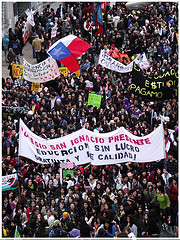Chile’s Massive Student Movement Goes Global

 Picture a place in which thousands of angry citizens have taken to the streets in massive protests against an economic system they consider unfair, amidst an uneven distribution of wealth and sky-high levels of debt, criticizing their leader who’s popularity has plummeted. Sound familiar? Now just imagine it all in Spanish. Before Occupy Wall Street and shortly after the dawn of the Arab Spring, one South American nation started its own popular uprising that continues to build steam.
Picture a place in which thousands of angry citizens have taken to the streets in massive protests against an economic system they consider unfair, amidst an uneven distribution of wealth and sky-high levels of debt, criticizing their leader who’s popularity has plummeted. Sound familiar? Now just imagine it all in Spanish. Before Occupy Wall Street and shortly after the dawn of the Arab Spring, one South American nation started its own popular uprising that continues to build steam.
For the past five months, public universities and high schools in Chile have been shut down as a result of protests by hundreds of thousands of students and their supporters demanding reforms to the nation’s educational system. In a country boasting one of the highest per capita incomes in Latin America, yet the most unequal distribution of wealth in the region, students have taken to the streets from north to south calling for education that’s affordable and accessible for all Chileans.
The problems started over 20 years ago when, as mentioned in an August article from the New York Times, “General Pinochet decreed a system in 1981 that encouraged the development of private, for-profit universities, which has led to high levels of student debt.” Although Chile has been considered a model for developing nations due to the economic policies implemented by Pinochet during his dictatorship, most Chileans have yet to receive their slice of the pie.
In April, two months before the massive protests began, the Organization for Economic Cooperation and Development (OCED) reported that “38% of Chileans find it difficult or very difficult to live on their current income.” For basic and secondary education, most students attend public schools which are underfunded and considered extremely inadequate compared to private schools, giving lower income and poor Chileans a huge disadvantage from the start. Then, as explained by blogger/photographer in Chile Kyle Hepp, the ones who are lucky enough to pass the rigorous college entrance exam, and can secure a loan, often find themselves attending the more expensive private universities that are also lower quality, hindering future job prospects.
As quoted in the New York Times:
“There is a very chaotic and broken-down system,” said María Olivia Monckeberg, author of two books on Chile’s university system. “The students and their families are tremendously indebted,” she added, and educational “quality is totally debatable.”
In response, Chile’s youth have been successful in organizing mass protests of at times over 100,000 people, taking over schools, holding sit-ins, and, according to Spain’s daily El País, helping sink President Sebastián Piñera’s approval rating below 30%.
Led by students, Camila Vallejo, president of the University of Chile’s student body Fech (Federación de Estudiantes de la Universidad de Chile), and Giorgio Jackson, head of the student federation at Chile’s Catholic University, Estudiantes de la Universidad Católica (FEUC), the organizers have met with the president and other politicians for talks that they now consider fruitless. Jackson was quoted in El País saying that the president’s stance has only hardened and that Piñera refuses to budge even a centimeter to give into the students’ requests.
Which is why Chilean student leaders Vallejo and Jackson are in Europe this week trying to garner support as they travel to Paris, Belgium, and Switzerland to plead their case and speak with representatives from the European Parliament, the UN, and the OCED. Chileans who support the students’ cause are behind them, hoping their slender Andean nation at the edge of the world can attract global attention like their disenchanted counterparts Spain, Greece, England, and the US.
[Photo By Resumen Grafico]
